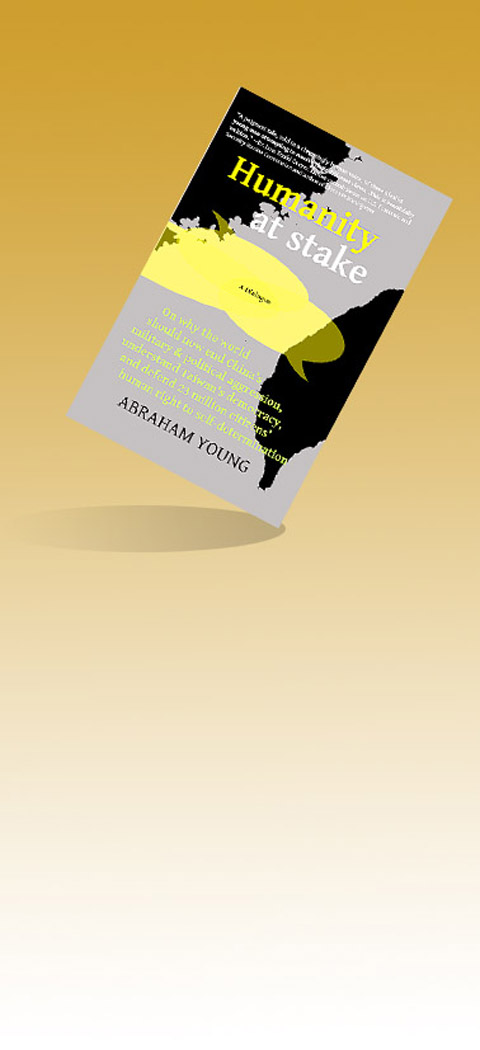The theme of this short book, little more than an illustrated pamphlet, is clearly stated in its subtitle: “On why the world should now end China’s military and political aggression, understand Taiwan’s democracy, and defend 23 million citizens’ right to self-determination.”
Occasionally it happens that an individual who’s been concerned with a particular issue for some time suddenly sees how the subject can most effectively be tackled. Abraham Young, still in his twenties, is an American citizen of Taiwanese descent who has been involved in lobbying the US Congress on the issue of Taiwan. But in this short essay, easily readable at a sitting, he describes a discussion with two coworkers that manages to put the essence of his case in a nutshell, making it simultaneously cogent, comprehensible and an attractive, easy read.
The author and two friends were packing up books in the basement of a New York bookstore on February 15 of this year, he writes. There was Wang, who was raised in China till he was 9, but then moved to Japan, and subsequently to the US. There was Chris, a former pilot with the US military (on a few occasions carrying nuclear weaponry), who had visited Beijing a couple of years previously but otherwise had no personal knowledge of China or Taiwan. And there was the author, educated in Taiwan from the age of 6 to 9, but the rest of his life a resident in the US. His grandparents had come to Taiwan with the KMT half a century ago, he later reveals.

A discussion ensues which culminates in an impassioned defense of Taiwan’s democratic freedoms by the author. Wang serves as a kind of devil’s advocate, claiming that Taiwan over-reacts and provokes China, that its press largely serves up propaganda, and that its elections are corrupted by vote buying. Chris, on the other hand, is the “typical” American who follows the line the US media often peddles, innocently believing that China has always had a hand in running Taiwan, that it is in truth a renegade province, and that the situation is roughly comparable to Hawaii sitting up and telling Washington it wants to be self-governing.
The author out-classes both of these dummy opponents with ease, needless to say. But this is by no means a facile polemic, or even something comparable to one of Plato’s dialogues in which Socrates’ friends are made to trip themselves up in their answers to his seemingly innocent questions.
Instead, Humanity at Stake is a curiously sympathetic work. On the one hand it contains a just and concise summary of Taiwan’s history, warts and all, but on the other it’s also a personal and even introspective account of two of the three individuals and their respective viewpoints.
Wang, in particular, is far from being presented as an unwavering advocate of Beijing’s position on Taiwan, or indeed on anything else. He’s written a journalism class paper, for example, on the loss of individual freedom in the US following the Sept. 11 attacks and the greatly increased surveillance, supposedly in the interests of national security, which followed. The author describes him as a natural lover of freedom and democracy, “more measured than I … less emotional, a Chinese patriotic nationalist indeed, but [also] … a thinker.”
In addition, the author questions his own fantasies (though in such a way as to make his own conclusions, when he gets round to them, even more convincing). “Don’t the old calcified authoritarianisms eventually die away one by one,” he muses, “as new people replace them, whoever they may be? Isn’t that the key component in how Taiwan eventually became a free democracy, and couldn’t this same fact of death and life facilitate China’s ability to change its aggression towards Taiwan?”
The three-cornered dialogue is lightly dramatized, too. Chris goes out for a bite of lunch, while Wang glances into the distance for a moment to consider something the author has said. In fact the whole pamphlet could be very effectively turned into a one-act stage play, in Taiwan especially.
There’s no stopping the diatribe with which the essay ends, though. China’s 1,400 or so missiles aimed at the boys and girls, fathers and mothers of Taiwan are an unforgivable affront. China has never defended this deployment, the author argues, quite simply because it is indeed inexcusable. China, he says, is deeply disturbed by the existence of a democratic Taiwan because it acts, on a daily, ongoing basis, to disprove the argument that a democratic system is inappropriate for a Chinese population, and that such people must be guided and ruled as they have always been by the decisions of a Mandarin class that invariably knows best and whose decisions mustn’t be challenged.
At this point the other two disputants disappear from view. In their place we have images of China and Taiwan from Google Earth, a photo of a Chinese missile that is then duplicated in miniature 1,000 times, and black-and-white pictures of happy Taiwanese, the author’s parents included, both in the 1960s and — either on political rallies or simply having a good time — over the last few years.
This is an admirable book. If ignorance about Taiwan is as extensive in the US as the author claims it is, then the sheer accessibility of this little publication is greatly to its advantage.
The text concludes with two appendices, one a signature-gathering petition the author organized at the time of Taiwan’s pro-peace 500km human chain of 2004, the other a letter of support from US Congress member Ileana Ros-Lehtinen, dated only three weeks ago. Readers of this new pamphlet with a personal connection with Taiwan are invited to add their own photos and comments at www.HumanityAtStake.com, with “What’s at Stake” as the subject line.

Taiwanese chip-making giant Taiwan Semiconductor Manufacturing Co (TSMC) plans to invest a whopping US$100 billion in the US, after US President Donald Trump threatened to slap tariffs on overseas-made chips. TSMC is the world’s biggest maker of the critical technology that has become the lifeblood of the global economy. This week’s announcement takes the total amount TSMC has pledged to invest in the US to US$165 billion, which the company says is the “largest single foreign direct investment in US history.” It follows Trump’s accusations that Taiwan stole the US chip industry and his threats to impose tariffs of up to 100 percent

On a hillside overlooking Taichung are the remains of a village that never was. Half-formed houses abandoned by investors are slowly succumbing to the elements. Empty, save for the occasional explorer. Taiwan is full of these places. Factories, malls, hospitals, amusement parks, breweries, housing — all facing an unplanned but inevitable obsolescence. Urbex, short for urban exploration, is the practice of exploring and often photographing abandoned and derelict buildings. Many urban explorers choose not to disclose the locations of the sites, as a way of preserving the structures and preventing vandalism or looting. For artist and professor at NTNU and Taipei

March 10 to March 16 Although it failed to become popular, March of the Black Cats (烏貓進行曲) was the first Taiwanese record to have “pop song” printed on the label. Released in March 1929 under Eagle Records, a subsidiary of the Japanese-owned Columbia Records, the Hoklo (commonly known as Taiwanese) lyrics followed the traditional seven characters per verse of Taiwanese opera, but the instrumentation was Western, performed by Eagle’s in-house orchestra. The singer was entertainer Chiu-chan (秋蟾). In fact, a cover of a Xiamen folk song by Chiu-chan released around the same time, Plum Widow Missing Her Husband (雪梅思君), enjoyed more

Last week Elbridge Colby, US President Donald Trump’s nominee for under secretary of defense for policy, a key advisory position, said in his Senate confirmation hearing that Taiwan defense spending should be 10 percent of GDP “at least something in that ballpark, really focused on their defense.” He added: “So we need to properly incentivize them.” Much commentary focused on the 10 percent figure, and rightly so. Colby is not wrong in one respect — Taiwan does need to spend more. But the steady escalation in the proportion of GDP from 3 percent to 5 percent to 10 percent that advocates